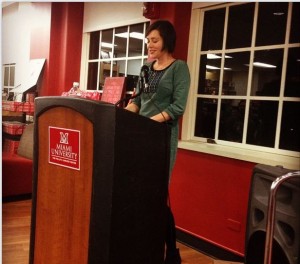By Lauren Bauman
Russia has always remained a mysterious giant in my mind, cloaked in the shadows of an unknown world defined only by the American media and a bitter history. One of the reasons I took Intro to Russian and Eurasian Studies here at Miami was to try and understand this region outside of the vague generalizations I see in the news. As a writer myself, I wanted to understand the people and hear their stories.
Kseniya Melnik visited Miami University on Monday, February 9 and was able to shed some insights on Russia and growing up in the Soviet Union. Her main question she asked when pursuing her story ideas was “What’s a good life in the Soviet Empire?” and what are the dreams people can have. Melnik grew up in Magadan, where the infamous Gulag system had a major camp. Despite the ominous staging, Melnik grew up with a relatively good life, having basic needs met even though there were shortages. Her stories in her collection Snow in May are able to paint a realistic picture—a personal picture—of life inside the Soviet Union that help us come to understand and visualize that part of the world better.
The story Melnik read during the book reading in the Shriver Bookstore was “Rumba,” a tale surrounding the tradition of dance and the arts in Russia. Although families were fraught with hardship, they still did what they could to involve their children in the arts. After she read the story, I asked her why she decided to write about dance. She explained something I had also learned in class, which Russians have a high esteem towards the arts and that authors, dancers, and artists have a big say in Russian culture. She said that during the 1990s in the transition to the market economy, people weren’t getting paid and were starving, yet they still paid for dancing schools and even Magadan had several in which Melnik also participated. Arts are important for Russians, as Melnik said that in school students memorize poetry, especially greats like Pushkin.
One of the joys of attending book readings done by the author is that you can hear the work in its “native” tongue. Hearing Melnik read her story gave it a certain flare that allowed me to sit back and listen. A question asked after the reading was how she sees translation and how she finds her voice. Melnik admitted the difficulties of trying to translate a Russian word in her head to an English word on paper when she wants to capture a specific feeling. Later she also said that her voice displays a Russian-ness throughout her stories that sometimes she couldn’t even see. As a reader, that sense of difference fascinates me to acknowledge a different world while connecting certain aspects to my own culture and life. The beauty of storytelling, whether true or not, allows the reader to see and experience a world that the character experiences, not just listing dates and events, but seeing the world through someone else’s eyes and coming to understand what happened. It’s a way we sympathize and connect with others.
Kseniya Melnik’s visit to Miami University shows the importance of a college student’s education in learning about the world from people outside of America. Instead of listening to generalizations and stereotypes, we are able to think critically upon issues and make better decisions with the knowledge we learn. I am able to pull away from the ominous Russian shadow and instead dig deeper and start to understand a people and their history that has grown into a rich culture of its own.
Lauren Bauman is a Sophomore majoring in Creative Writing at Miami.

